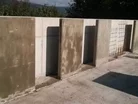Cardiff University trials self-healing concrete

The first major trial of self-healing concrete in the UK, led by a team of researchers from Cardiff University, is being undertaken at a site in the South Wales Valleys.
The project, entitled Materials for Life (M4L), is piloting three separate concrete-healing technologies for the first time in real-world settings, with a view to incorporating them into a single system that could be used to automatically repair concrete in the built environment.
It is estimated that around £40 billion a year is spent in the UK on the repair and maintenance of structures, the majority of which are made from concrete.
The overall aim of the Cardiff-led project is to develop a single system that can be embedded into concrete when it is initially set, and then automatically sense when damage occurs. Once damage is detected, the system will be able to repair itself autonomously without the need for human intervention.
The trial is being undertaken in collaboration with one of the major industrial partners on the project, Costain, and is taking place at one of their construction sites on the Heads of the Valleys road improvement scheme in South Wales – the A465.
The research team, which also includes academics from the University of Bath and the University of Cambridge, is trialling three separate technologies at the site.
The first technique uses shape-shifting materials, known as shape-memory polymers, to repair large cracks in concrete. When these materials are heated with a small current, they can transform into a different shape that the material has ‘memorised’. The researchers believe that these materials can be embedded into concrete and used to close cracks or make them smaller.
In the second technique, researchers will pump both organic and inorganic healing agents through a network of thin tunnels in the concrete to help repair damage.
In the third technique, the team will embed tiny capsules, or lightweight aggregates, containing both bacteria and healing agents into the concrete. It is anticipated that once cracks occur, these capsules will release their cargos and, in the case of the bacteria, the nutrients that will enable them to function and produce calcium carbonate, which the researchers envisage will heal the cracks in the concrete.
The researchers have cast six concrete walls at the test site, each containing the different technologies. Over time the team will load the concrete at specific angles to induce cracks, and then monitor how effective each of the self-healing techniques is.
Professor Bob Lark, the principal investigator on the project from Cardiff University’s School of Engineering, said: “Our vision is to create sustainable and resilient systems that continually monitor, regulate, adapt and repair themselves without the need for human intervention.
“These self-healing materials and intelligent structures will significantly enhance durability, improve safety and reduce the extremely high maintenance costs that are spent each year. This major trial, the first of its kind in the UK, will provide us with important insights to help transfer the technologies from the lab into real-world settings.”
Oliver Teall, a civil engineer at Costain, said: “We are supporting this innovative research to unlock the many potential benefits of self-healing concrete for use within infrastructure. From this trial we should gain an insight into the feasibility of constructing a full-scale structure using these techniques and their early-stage effects on structural properties. We will be monitoring properties such as stiffness, permeability and the mechanical damage recovery of the trial walls in comparison with conventional reinforced concrete walls.”
Read the November 2015 issue of Construction Global and follow @ConstructionGL
- Foundation Durability: Precast Concrete and its RivalsBuilt Environment
- Why is Tesla Bidding to Supply the UK with Renewable Power?Sustainability & Green Building
- London Pioneers Sustainable Urban Heating InitiativeSustainability & Green Building
- Skanska & Holcim Lead way on Sustainable Roads ConstructionBuilt Environment



